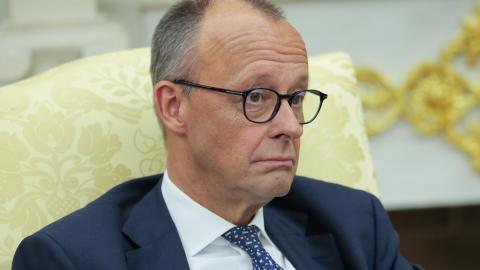When Friedrich Merz arrives at the White House today, he will be the third German chancellor to meet Donald Trump since the latter won the presidency of the United States in November 2016. After two false starts, the third time should be the charm.
Merz exemplifies what Trump has been demanding of Europe since taking office: a leader with the power and the inclination to rebalance the alliance. With today's visit, the prospect of a productive American-German partnership is finally within reach, if Trump decides to grab it.
In many respects, the new German leader is a natural partner for a Republican president. After cutting his teeth in Helmut Kohl’s conservative Christian Democratic Union, Merz served in senior capacities at multiple U.S. firms’ German operations. His commitment to a strong alliance with America and his proximity to German business have long formed the twin pillars of his political identity. Merz, like Trump, also fell out with Angela Merkel. A dyed-in-the-wool transatlanticist who embraces market economics and couldn’t get along with Angela Merkel? There is much for Trump to like.
Yet Merz is an old-school conservative, not a new-right populist. After the Trump-Zelenskyy blow-up in the Oval Office, Merz upbraided Washington for instigating a “deliberate escalation.” He still bristles over JD Vance’s February remarks to the Munich Security Conference, where the U.S Vice President launched an extended critique of Europe’s establishment. Merz also disdains Alternative for Deutschland (AfD). While the Trump administration has flirted with the German opposition party, Merz has sought to isolate them.
Some in Trump’s orbit may view these characteristics as warning signs. But Trump should ignore them as background noise and focus on the essentials. First, the economic reality: only Germany has the power to operationalize burden-sharing and turn Europe into a self-assured actor capable of deterring Russia. Germany dominates the European continent; its gross domestic product (GDP) is over five-and-a-half times as large as that of Poland, the economic silver medalist in central and eastern Europe.
Moreover, Merz is wasting little time converting Germany’s economic power into strategic muscle, a quality Trump can surely appreciate. Even before his swearing in, the new chancellor risked the ire of fiscal conservatives by cutting a deal to exempt most defense outlays from Germany’s constitutional debt brake.
What’s more, Johann Wadephul, Merz’s foreign minister, committed to spending five percent of Germany’s GDP on defense at the NATO foreign ministerial last month in Turkey. Wadephul is now campaigning for that five-percent threshold to be adopted across the alliance. One week after his foreign minister’s commitment, Merz activated the 45th Armored Brigade “Lithuania” in Vilnius, marking the first permanent basing of German forces abroad since World War II. Days later, he welcomed Zelenskyy to Berlin with a multibillion-euro package that includes financing for the production of long-range missiles on Ukrainian soil. All of this in the month of May alone.
As Merz has emphasized repeatedly, these early moves are a direct response to Russian aggression in Ukraine. But they also reflect the unease in Berlin over Trump’s handling of Ukraine and Europe.
Trump is engaging in a high-wire act that requires dexterity and balance. He is pulling back U.S. support just enough to push allies like Germany into spending more on defense without going so far as to risk a general war on the continent. To date, he is succeeding. The risk is that Trump may push allies to go beyond burden-sharing, as my colleague Joel Scanlon has written, and prompt them to pursue outright hedging behavior.
To the naked eye, it would be hard to spot the difference between burden-sharing and hedging, as European defense outlays would look the same under both scenarios. But the strategic differences for the United States would be enormous.
So long as Germany retains its basic confidence in Washington, Berlin will use the defense modernization Merz is initiating to increase Europe’s role in the North Atlantic Treaty Organization. This is the ideal scenario—the option Merz prefers—and it would come with flush defense contracts for U.S. companies. It would also reinforce America’s diplomatic heft as the U.S. maintains its traditional leadership role of the West.
But if Berlin begins to doubt Washington’s basic commitment to collective defense, it may embrace continental ambitions of European strategic autonomy. In this case, Europe could drift into a position of soft neutrality regarding Sino-American competition, and could prove an even more difficult counterparty in trade negotiations. Its weapons purchases would go to European, not American, defense companies.
Friedrich Merz is no Angela Merkel. Trump finally has the partner he needs to forge the transatlantic compact he has so long sought. He should seize the moment and grasp Merz’s extended hand of friendship.















